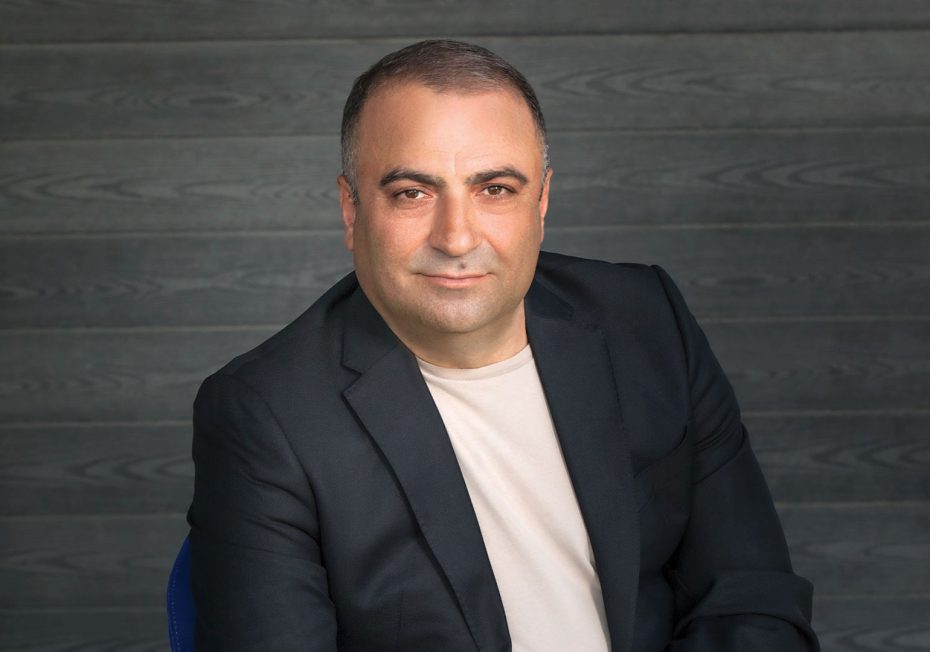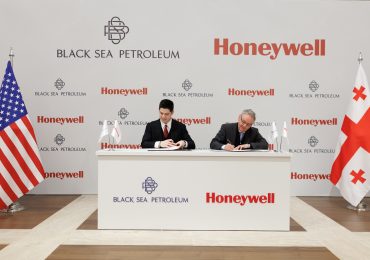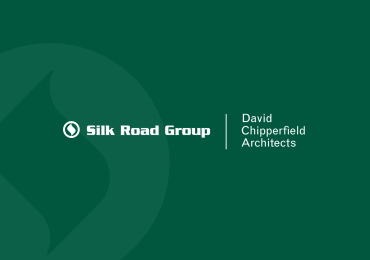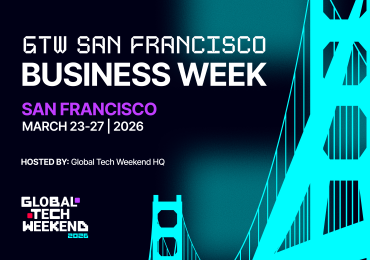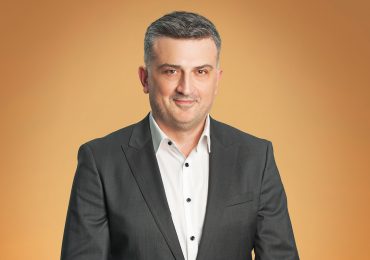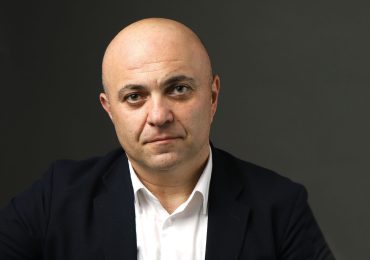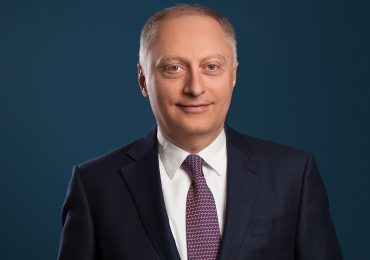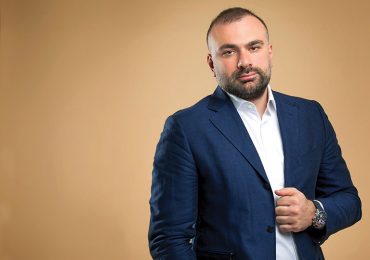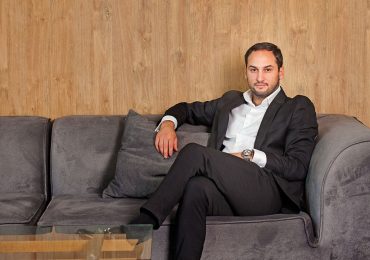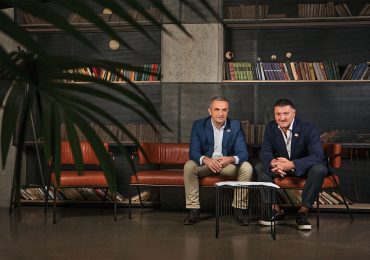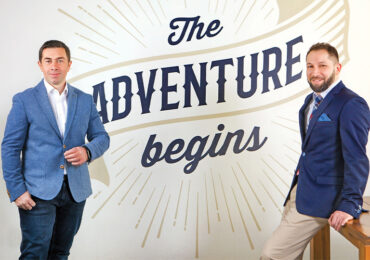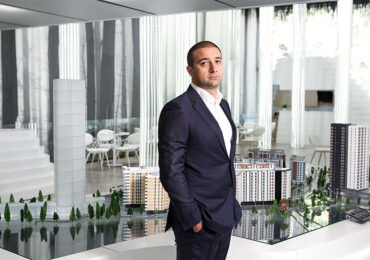More than 750 employees, millions paid into the state budget, sixteen years on the market, and opportunities derived even from the greatest challenges – this is Nova, a company founded by five good friends. Its supervisory board is currently chaired by Zviad Abuladze.
The chair of the supervisory board at Nova, Zviad Abuladze, is celebrating his fiftieth birthday. Our interview coincides with his big day. We meet at the Nova head office to record our interview. Zviad talks endlessly about his family, friends, work, and business partners. It is evident that at fifty years of age, he has a wealth of useful insight to offer to budding and experienced businesspeople alike.
He passionately believes that hard work, trust, making the right choices, and transparency can help overcome all obstacles one may encounter, and even turn these challenges into success stories. According to him, you can start as a simple trader at the Eliava Market and end up observing your life and business from lofty heights fifty years later. All these positive beliefs are nothing if not contagious.
The production of construction materials, a large distribution network, exports, six megastores across Georgia and an online store – all of this operates under the umbrella of Nova. The company first appeared on the market in 2006.
There is an interesting story behind the company’s name. The founders decided to use the first letters of their respective places of birth. Jemal Antadze was born in Nasakirali, Ramaz and Emzar Imedadze in Ortabatumi, Zviad Abuladze in Vashlovani, and Jemal Bolkvadze in Akhalsheni.
Forbes Georgia visited one of the partners and chair of the company’s supervisory board, Zviad Abuladze, at the Nova head office. Today it is quite a big location, but back in 2006, when the company was taking its first steps in business, it was only 90m² in size. This is where it all started with the import and sale of construction materials.
2011 was a crucial year for Nova. For the first time, the company started to manufacture its own goods to add to imports.
Zviad Abuladze always had a vision for the company’s strategic development. His business partners turned this skill into a responsibility and entrusted him with the reins.
Born in the village of Vashlovani to a school director father and a nurse mother, Zviad Abuladze displayed his talent for math from an early age. He finished school with high grades and studied communications at university, but never got to work in this field.
He soon married and realized that the salaries of a school director and a nurse would not be able to support the whole family, so he started a small business. He was always keen to work, took various jobs and did not shy away from manual labor. He also learned to manage risk from an early age.
A man’s story starts with his family, and for Zviad Abuladze family stability means success. His wife works at the Ministry of Health, while his children were educated abroad and are now successfully working in their respective professions. You can feel gratitude in Zviad’s voice when he talks about his family, and his wife in particular: According to him, harmony in the family is an important prerequisite for his success in business.
The topic of conversation switches from family to friends. In Zviad Abuladze’s case, his friends are also his business partners.
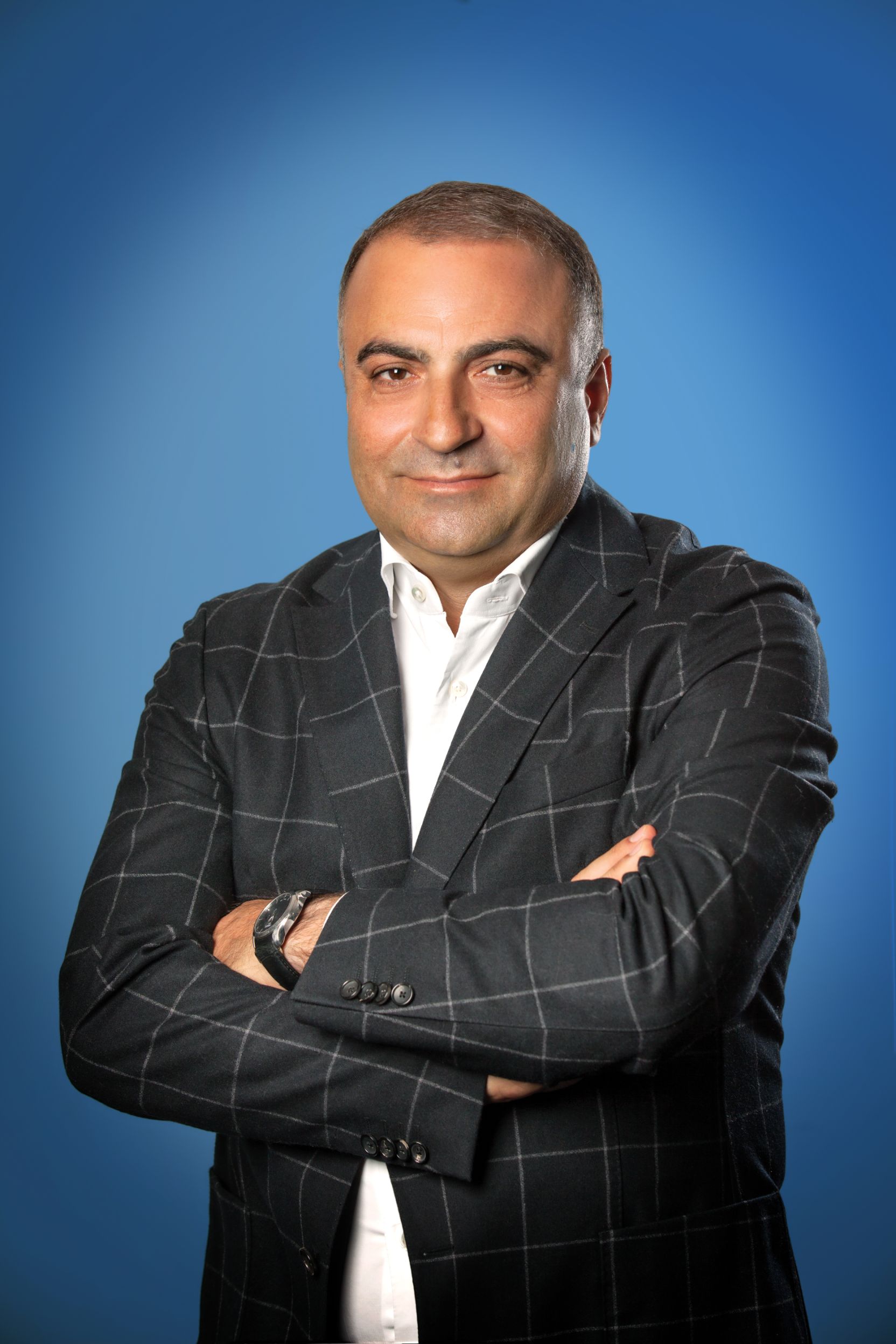
Zviad has been in business with his friends since 2005. The office on Agladze Street, where our current interview is being recorded, was only 90m² in size back then. Zviad and his partners saw the opportunity to expand their business, and the company has continued to grow ever since.
The term marketing was rarely used at the time the company was founded, but Zviad Abuladze’s business instincts did not betray him then either. After three months of active discussions, the young family firm Vesta designed Nova’s now-iconic roof logo.
Coincidentally, roofing materials were the first goods manufactured directly by Nova in 2011. Later the company expanded its production to include gypsum profiles and polyethylene tanks. These processes required more investment in production lines, more space, more staff, and many important projects.
Today Nova operates in several fields, including manufacturing, B2B and retail sales, exports, and imports. The small office has expanded into 90,000 m² of company space in Tbilisi and Batumi. With the help of the financial sector, the Enterprise Georgia program, EBRD and other partners, Nova has acquired these territories and continues to grow.
The company manufactures more than four hundred products, including polyethylene tanks, roofing materials, drainage systems, façade claddings, gypsum and metalloplastic profiles, trash containers and various accessories.
International brands exclusively represented in Georgia by Nova include Nippon Paint Group (Betek, Fawori), Saint-Gobain Group (Izocam, Rigips), INGCO and Bien.
2020 was another crucial year in Nova’s history, as the company managed to turn the pandemic into an opportunity and opened new retail megacenters for construction materials in Tbilisi and Batumi. In total, Nova currently operates six megacenters in Tbilisi, Batumi, Kutaisi, Gori, Telavi and Marneuli, selling over 40,000 items.
The company has more than 750 employees.
Our interview coincides with your fiftieth birthday. Perhaps it is a good time to reflect on your company’s success. Where do you see Nova in the future?
When we founded the company, we only had ten employees. That number has grown to almost eight hundred. Last year we contributed ₾45 million to the state budget in the form of VAT and other taxes. Our company has been among the one hundred largest taxpayers in the country for several years already. According to Forbes Georgia’s rankings, we are also among the twenty largest manufacturers in Georgia. We constantly seek to improve these results even further.
We only began operating in the retail sector a couple of years ago. This was something completely new for us. By the end of this year, we will already have mega-centers in seven cities across the country.
Our goal is to be among the fifty largest taxpayers and ten largest manufacturers in Georgia in the near future.
Will B2B remain a priority for you?
Most definitely. We believe that the development of our retail segment will not affect our B2B relationships with customers. We will always seek to retain their interest, whether through our pricing policy or our high standards of service.
We understand that we have competition, and we believe that we can maintain the right balance. We always have our finger on the pulse and we realize how difficult it is to remain competitive.
Do you employ innovative approaches to gain an advantage over your competitors?
Wherever there is intellect, there is also innovation. Since 2010, we gradually realized that we had to apply a system to our business, rather than continue relying on old approaches based solely on trust.
We obtained ISO certificates in order to improve the company structure. We wanted to have a structure where each activity falls under the responsibility of a single person or unit.
Only two Georgian enterprises received EBRD grants worth €300,000, and we were one of them. We were given the grant to invite experts from the EU to Georgia to share their experience with us. We have already hosted world-class professionals, and the program is still ongoing. We are currently focusing on human resources. Projects in the fields of manufacturing, logistics, finance, and retail sales have already been implemented, and the results can be clearly seen.

We have implemented the new 1C program with BDO. Our company has fully mastered almost all modules of the comprehensive program within three months.
Over the past few years, the company has focused particular attention on systemic development. We realize that results will not be achieved instantly, but will provide a good foundation for implementing even more innovation and achieving stable development in the future.
When you talk about competition, do you specifically mean local competitors or does this concept have a broader meaning to you?
We have a liberal economy in this country, which presents both opportunities and challenges. Georgia has free trade agreements with Turkey, China, countries of the post-Soviet space and the European Union. We hope that the current partnership with the United States will also soon expand into a free trade agreement. This would create a fantastic opportunity with regards to exports.
On the other hand, Georgia has to import around 95% of raw materials for construction and renovation. There is no duty on most of these imports, which allows us to stay competitive abroad. Georgia’s liberal economy ensures competition on the local market. However, doing business is interesting precisely because you always must be at the top of your game and never stand still to remain competitive. This applies to us as well.
Could you give specific examples?
For example, our turnover in 2021 was more than ₾200 million including VAT. This is a significant amount for our country. It indicates that we hold a healthy and competitive position on the market. Our goal is to grow even further. We already have the vision and specific tools for this.
Until 2020, our company was better known for its B2B activities, but the development of our retail business has created new challenges and opportunities. We recently underwent rebranding, created a brand book, and changed our logo. We live in the twenty-first century, where awareness creates trust.
What kind of management style does Nova have?
The company was founded by five of us. In the sixteen years since then, we have never argued about the distribution of revenue, because our finances are very transparent. This is a key component of mutual trust, respect, and discipline.
I was the company CEO until 2017. However, our development process required the owners to step aside from management. We created the Supervisory Board, where we curate the same segments for which we were responsible as part of the management team. Ramaz Iremadze oversees manufacturing and infrastructure. Thanks to him, our manufacturing activities are proceeding smoothly. Jemal Bolkvadze and Jemal Antadze curate imports. This was their main area of responsibility from the very beginning of our business partnership. As for Emzar Iremadze, he mainly deals with logistics. My own area of responsibilities are finance and human resources.
In 2018, Nova underwent significant structural changes. Edisher Khimshiashvili became the company CEO. He manages all our operational activities together with the six directors and department heads.
It seems that you have fully delegated responsibilities. Nova is no longer a small company. How fast is the decision-making process?
The Supervisory Board approved the company strategy, which makes the decision-making process easier. The strategy is reviewed and approved annually. It is true that the company has grown substantially, but decisions are made quickly due to proper delegation of responsibilities.
It is important to have a systems-based approach to management. It is also important to have a corporate culture that all employees subscribe to.
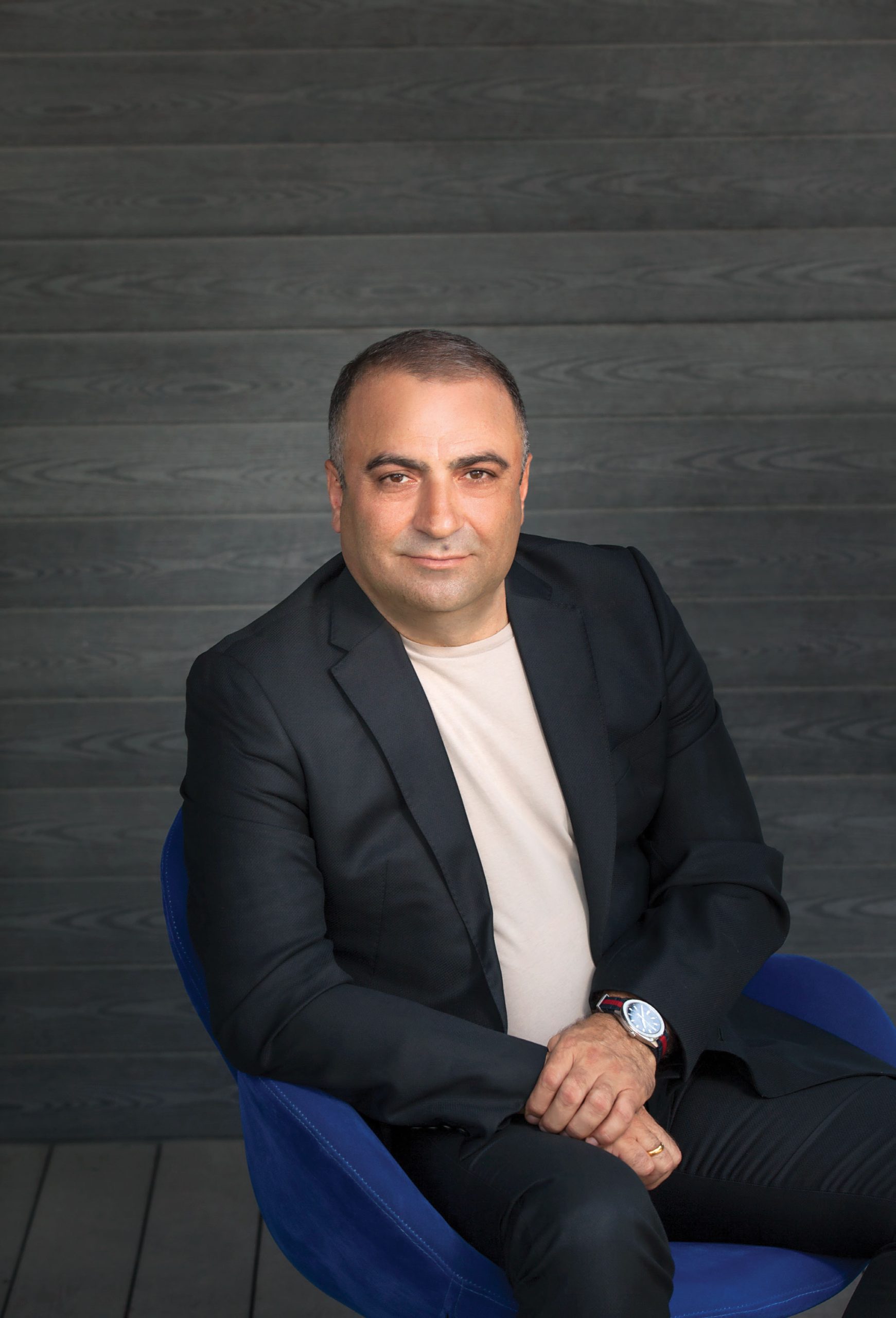
It is often said that fifty percent of business is management, while fifty percent of management is discipline. This is something that I believe to be true.
We constantly seek to ensure that all our staff are motivated and have the best possible working conditions, and that our employee retention is high.
Is it a challenge to find qualified personnel?
The lack of qualified personnel certainly presents a challenge. Our preference is to retain staff for as long as possible, help them grow and establish themselves as professionals at our company. We want all our employees to be happy with their working conditions and salary. The average salary of our workers is ₾1200, while welders can earn up to ₾4000 depending on their qualifications.
We constantly tell our staff that their professional growth will definitely achieve results. If they cannot maximize their development within our company, we will create the necessary conditions for them to become more professional.
We do everything to ensure that our staff feel well looked after. Against the background of the pandemic, war, and rising inflation, we increased their salaries and put emphasis on raising wages in line with inflation. We also ensure that our employees work in a safe and comfortable environment. This includes the provision of insurance packages, staff catering, special equipment, and a sizeable budget for motivating and encouraging staff.
We know that whenever a company grows, employees start asking themselves: How is this growth affecting me? Has my personal income increased?
On the other hand, growth creates the need for additional personnel. We always try to promote existing staff first. Promotion means a higher salary and more benefits. We, therefore, ensure that everyone is promoted on merit in order to avoid a sense of injustice among employees.
Our corporate culture revolves around people: They must feel that we are looking after them. Success is only possible through a team effort.
Fifteen years on the market is quite a long time. You have had to deal with numerous serious challenges such as the 2008 war with Russia, the 2008-2009 global financial crisis, the 2015 crisis, the pandemic, and now the war in Ukraine. How do you manage to cope with such difficulties?
Every challenge brings a window of opportunity. In business, you often come up against a wall and are left with two choices: Either find a door or break through the wall. Either way, it may take some time. It is especially painful to realize that you are being hindered not by your own limitations, but by external factors. This is when you must see the window of opportunity.
Be “reasonably ambitious”. Never try to climb the ladder two rungs at a time. When you climb one rung, you can see the next one on the horizon. As you go forward, the horizon must always be visible.
We hired one hundred and twenty new personnel during the lockdown in 2020. We had invested a lot of effort in expanding the retail business, improving our infrastructure, and training additional staff. We decided not to put the development process on hold. 2021 was quite a successful year for us. Sales increased significantly, while positive financial figures almost doubled. Furthermore, people’s priorities changed during the pandemic. Demand for country homes, apartment extensions and renovations increased. We also perceived this as an opportunity.
Since the start of the pandemic, we created approximately three hundred new jobs, increased our turnover and contribution to the state budget, created additional production lines and opened new mega-centers. We did an excellent job in calculating the risks and assessing our capabilities.
Naturally, there were challenges. When you consider that the import of raw materials and finished products takes three to four months, goods worth around ₾30 million are in transit at any given time. This chain cannot be broken. There have been occasions when we received 500 tons of products and sold them the same day. Nova’s annual turnover of goods exceeds 150,000 tons. Naturally, logistics have always presented a challenge for us, and continue to do so. Sudden price hikes are also a significant problem.
Has the war in Ukraine been more damaging for you than the pandemic?
The most serious long-term effect of the pandemic is the high inflation. It affects the consumer’s purchasing power, which always creates a challenge for businesses. However, we saw the pandemic as more of an opportunity than a challenge.
The war in Europe is very problematic for several reasons. Foremost of all, Metinvest and the Azovstal plant were one of our largest partners. What happened in Mariupol is horrific – the ultimate human tragedy. So many people are losing their lives in this war.
As part of our agreement with Metinvest, we were due to receive more than 10,000 tons of goods. To this end, we improved the infrastructure in Adlia, built a 2000m² industrial warehouse and installed a 32-tonne crane. Manufacturing and raw materials next to each other – this was a wonderful opportunity for us.
We are allowed to sell the raw materials processed by us in EU member countries. Products manufactured in Georgia using Ukrainian or Turkish raw materials are considered Georgian. Both countries are subject to quotas on the EU market, but these quotas are set to expire in January or February.
It is an amazing opportunity for us to manufacture products in Georgia and sell them in Europe. The war took away the prospect of maximizing this opportunity for at least two to three years.
How important is the Russian market for you?
One of our main advantages is the fact that we were never dependent on the Russian market to any significant extent. It was never particularly attractive for us. Even before the war, we did not see it as a stable market due to their post-Soviet approach towards doing business. We realize that business has no borders. Nevertheless, we never had the desire to establish strong ties with Russia.
Despite this period of high uncertainty, do you have any future plans that you could tell us about?
The pandemic created several windows of opportunity. I must point out that government support greatly helped us take advantage of these opportunities. Since 2021, when the state program Enterprise Georgia doubled the number of loans, we have been able to invest an additional ₾10 million in manufacturing. This allowed us to maximize the output of our main production lines of roofing materials. We acquired and launched the production line of façade claddings, which is a new product on the Georgian market. We also began manufacturing rubbish bins and containers. We decided to invest another ₾20 million into our business by the end of 2022.
Enterprise Georgia creates great opportunities both for businesses and the state. The program stimulates job growth, brings more revenue into the state budget, and increases exports. Most importantly, the business sector has a stable partner in the shape of the government.
In 2021 we set ourselves the goal to open four new mega-centers in 2022. Three are already operating, while the fourth one will open in Khashuri in August.
Despite the challenges associated with disruptions in the operations of Metinvest, we will launch the production of metal pipes by the end of 2022 as planned. We have acquired three metal cutting machines that enable production of square and round pipes. This equipment will allow us to substitute the import of 15,000 tons of finished metal products each year.
In the future, we may need to invest another €2.5 million to be able to produce a full range of square and round metal pipes, which we will then sell on the local market and internationally.
We expanded our manufacturing location in the Adlia district of Batumi to five hectares. The infrastructure will soon be ready to receive raw materials and become fully operational.
We will also be launching two production lines in Tbilisi, including one for XPS insulation materials. At present, these materials are not being produced anywhere else in Georgia or the wider Caucasus region. We have acquired high-performance manufacturing devices that meet the EU CE standard. The total value of our investment is $1.4 million.
We have also invested around €1.3 million in the production of dry cement-based adhesive materials. We are the official representatives of the Betek brand of Nippon Paints in Georgia. These brands are also widely known and popular in Armenia and Azerbaijan. Production under the Betek franchise license will begin in late 2022. Estimated manufacturing capacity will be 50,000 tons per year.
2022 has been an outstanding year in terms of investment. By the end of the year, we will have invested more than ₾30 million into production lines, infrastructure, and retail. This translates into nine hundred new jobs, more exports, and more manufacturing in Georgia.
2023-2024 will probably be a period of consolidation and development of what we have achieved so far. We will give the management team enough time to adjust to the pace of development more effectively.
We hope that 2026 will be another momentous year for our company when we celebrate our twentieth anniversary. We believe that by the end of 2026 the number of our employees, our contribution to the state budget, our exports and our turnover will be at least 50% higher than today. This will translate into 1200 additional jobs and more than ₾300 million in turnover.
We wish you all the best. What is your final message to our readers?
Business cannot be learned in theory alone. Without practice, punctuality, determination, and responsibility towards partners, suppliers, and customers, it is impossible to gain trust.
Always work hard. As a young person, you should always do what you truly love, but make sure you put the effort in. Hard work always pays off, it makes you generous, increases your professionalism and reflects positively on your welfare. If you do not believe in this, then you will struggle to achieve success.
Be “reasonably ambitious”. Never try to climb the ladder two rungs at a time. When you climb one rung, you can see the next one on the horizon. As you go forward, the horizon must always be visible.

